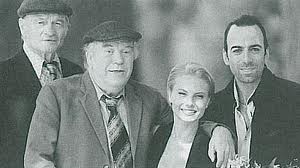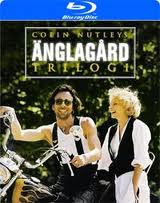Thornton Wilder, William Saroyan and John Steinbeck all eloquently wrote about small town life and characters but never touched on the fundamental attribute of small towns, which is that they're xenophobic beyond belief. Maybe not so much now, with that crazy internet contraption bringing entertainment, culture and social interaction to even the tiniest berg, and in essence, chasing away that deep-seeded fear of the unknown outside world that seems to permeate every small town. However, back in prehistoric, er, I mean pre-internet times, strangers arriving in any small town were about as welcome as adults visiting a Children of the Corn Sunday school. I know, I used to live in a small Swedish burg that was strangely enough located in central California. I can say from experience, the welcome wagon didn't exactly come barreling down the street when someone new rolled into town. You'd think in a dull, placid, small town environment, the arrival of young, mysterious, provocative strangers would be a warmly welcomed diversion. You'd think.
It's a big reason why Änglagård is one of my top twenty films of all time, as it absolutely nails the secrets, lies and fears that run rampant in small towns among their denizens. I can't express just how much I identify with this film and its themes. Some may perceive it as nothing more than a frothy bit of charming fun, which it most certainly is. However, the underlying observations are brilliantly spot-on concerning small town life and attitudes. And although the two follow up sequels lack the spark and perceptiveness of the first, I was nevertheless happy to follow the continuing story of the entertaining, and in some cases, lovable characters.
It's a big reason why Änglagård is one of my top twenty films of all time, as it absolutely nails the secrets, lies and fears that run rampant in small towns among their denizens. I can't express just how much I identify with this film and its themes. Some may perceive it as nothing more than a frothy bit of charming fun, which it most certainly is. However, the underlying observations are brilliantly spot-on concerning small town life and attitudes. And although the two follow up sequels lack the spark and perceptiveness of the first, I was nevertheless happy to follow the continuing story of the entertaining, and in some cases, lovable characters.
Änglagård
Made in Sweden by English filmmaker Colin Nutley in 1992, Änglagård (House of Angels), tells the tale of the quiet, sleepy town of Yxared in rural Sweden that is thrown into tumult by the arrival of the beautiful granddaughter of one of its recently deceased citizens. Fanny, who rides into town on the back of her friend Zac's hog, shows up just in time to make an unintended big splash at her grandfather's funeral. Initially, no one in town knows who the sexy blond woman and her rather imposing, black leather clad companion are. But as it becomes clear, things begin to spin out of control. The funeral crashing scene at the outset of Änglagård becomes almost a running gag throughout the trilogy, but never works as well as in its initial appearance. Fanny, as played by the luminous Helena Bergström, is the focus of the story and brings a wonderful, effervescent, sexy quality that is downright irresistible. Most of the men in the town are charmed by her immediately much to the chagrin of their women. Zac, played with a stoic bemusement by Rikard Wolff, is Fanny's near life-long friend, companion and business partner. With his tall, angular appearance, dark dress, deep baritone voice and laid-back demeanor, he is the perfect compliment for Fanny. As Fanny flitters about like a hummingbird on speed, Zac calmly follows in her wake smiling at the ruckuses she creates. The main antagonist of the story is the richest farmer in town, Axel Flogfält played by Sven Wollter, who covets the property just inherited by Fanny. When Axel makes a somewhat condescending offer to buy the property from Fanny, who had already stated she was going to sell it off as soon as possible, she capriciously changes her mind and the war is on. Stuck in the middle is Axel's wife Rut, who harbors a long held secret about Fanny; Axel's son Märten, who has a crush on Fanny; the good-natured local vicar Henning who acts as a reluctant referee and delivers a great sermon about tolerance later in the film; and eccentric old brothers Gottfrid and Ivar whom Fanny forcibly and humorously befriends early on.
As I've previously said, the tone of the film is light and sweet, which may cause some to dismiss it as a fluffy, if heartfelt, comedy. Thematically though, the film delivers strong messages about xenophobia, secrets and forgiveness that really pack an emotional punch coming from characters that become quite lovable over the course of the movie. Every time I view this film, it's like meeting up with old friends again. The acting seems very natural and improvised with the characters not overly written. The cinematography by Jens Fischer (son of Gunnar Fischer - Bergman's frequent cinematographer) is excellent with incredibly beautiful shots of the countryside in particular. Fischer's work actually improves in the two follow ups, but it is still pretty amazing in this one. The music by Björn Isfält and Göran Martling is also superb featuring a strong mix of classical and modern. I couldn't help but smile at the scene where the vicar is driving along and rocking out to an ABBA song on the radio. Colin Nutley, who both wrote and directed the entire Änglagård trilogy, captures small town life, characters and their quirkiness like no one else and does it with a sweet playfulness that never looks down on the town's denizens but rather celebrates their oddness. At the same time, he never shies away from the darker aspects of the small town personality such as the suspicion of strangers and the fear of breaking routine. Score 8.5/10
Änglagård 2 (1994)
The first film of the trilogy is by far the strongest due mostly to how well integrated all the components are mixed, particularly story and character. In the second part of the trilogy, Änglagård - Andra sommaren (House of Angels - The Second Summer), Nutley makes a serious misstep story-wise by having several of the characters leave the small town and come to America right in the middle of the film. This is a near disaster in terms of pacing, story, characters and especially tone which really gets thrown out of whack. There's somewhat of a save at the end when the characters return to the village, but everything about the trip to the states feels contrived and unbelievable. Even the transition itself was jarring to the point that I initially believed it to be a dream or fantasy sequence. Another glaring problem is that the character of Axel has pretty much been neutralized in the antagonist's role. In fact, there's only a minor unresolved subplot from the first film involving Axel's son to keep any kind of tension going. Oddly, this plot point is not even addressed until the third film. I have to wonder if the second film was rushed into production without any kind of a fully formed story as much of it felt forced. Despite the presence of these near fatal flaws, almost all the other components that made the first film so enjoyable are present in the second. The look is surprisingly superior to the first, the music is now fully orchestral, almost all the beloved characters (and the actors who portrayed them) are back, and there are some humorous call-backs to the first movie. All in all, The Second Summer is a flawed if technically well crafted film. It's so well made that it's worth a look on those merits alone, and I still enjoyed seeing these characters again even if the story didn't quite cut it. Score 6/10Änglagård 3 (2010)
I was trying to think of a movie series that has had a longer hiatus between the second and third sequels than this trilogy. Then I realized Godfather 3 was made sixteen years after the second one, eighteen years after the first, just like the Änglagård movies! Fortunately, the last film in this trilogy Änglagård - Tredje gången gillt is better than the second one, but it's also the darkest and most poignant of the three. Again, this film had some humorous call backs that elicited a smile from me, and the cinematography was once again top-notch, but the characters and tone changed so much due to the passage of time, it was hard to think of this film as a follow up. It's like trying to reconnect with people after a sixteen year absence when you just left their younger versions yesterday. A strong sense of melancholy and sadness pervades the movie right from the start with the passage of a major character. Fanny, her daughter Molly, and Zac have settled down in the city. Molly finds out about a long kept secret that has been withheld from certain characters throughout the trilogy and convinces her mother and Zac to travel back to Yxared. Fanny then attempts to reconnect and reconcile with the town. Where the second film seemed to have lost its way thematically speaking, the third brings back messages of trust, tolerance and forgiveness. It's still a far cry from what the first film achieved, and the tone is a bit of a bummer, but is does bring a sense of resolution to the trilogy. Score 6.5/10
Both the second and third Änglagård films lean heavily on the first in terms of character background and story so its vital that the first film be viewed in order to understand the subsequent sequels. After viewing the original, it is almost impossible to avoid watching the sequels as the characters are so entertaining, likable, and for me, familiar. Trilogy score 7/10









No comments:
Post a Comment